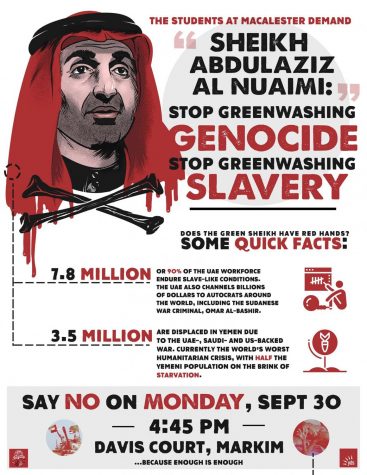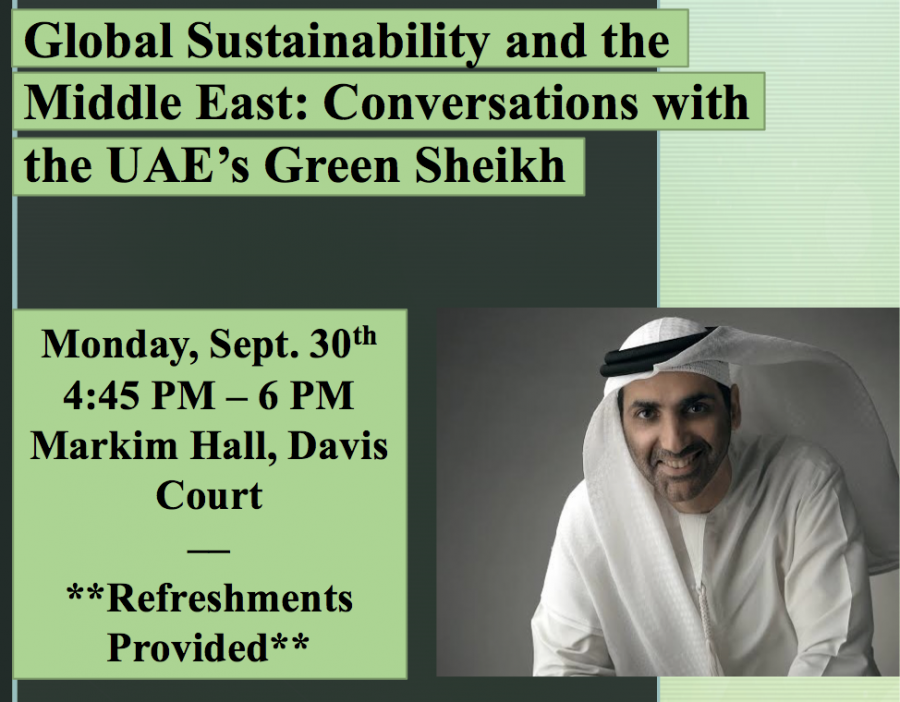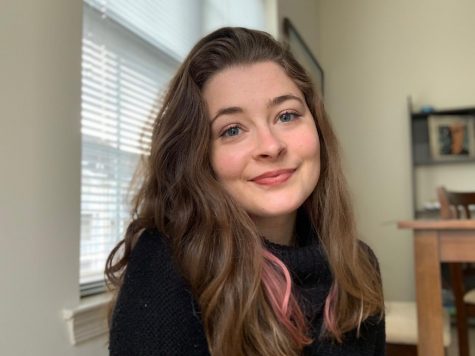Green Sheikh appearance cancelled amid protests
Poster of the original event, “Global Sustainability and the Middle East: Conversation with the UAE’s Green Sheikh.”
October 3, 2019
When Karinna Gerhardt ’20 and Jason Kohn ’20 met Sheikh Adbul Aziz al Nuiami while studying abroad through the SIT Jordan program last year, their program director told them not to ask him any controversial or political questions.
Al Nuaimi, a self-proclaimed humanitarian who has dubbed himself the “Green Sheikh” to reflect his purported environmentalism, is a member of the royal family of Ajman in the United Arab Emirates (UAE).
Al Nuiami’s humanitarian interests, coupled with his ties to the autocratic regime of the UAE, intrigued Gerhardt and Kohn. They left their encounter with the Sheikh with more questions than answers, and a desire to learn more.
They kept in touch with al Nuiami over the summer via Facebook. When he expressed an interest in speaking at college campuses in the United States, they jumped at the chance to invite him to Macalester and scheduled an event for this past Monday, Sept. 30.
But late last Wednesday, Kohn sent an email to various members of the campus community announcing that the event was cancelled.
The event was titled “Global Sustainability and the Middle East: Conversations with the UAE’s Green Sheikh,” and was sponsored by Pi Sigma Alpha, the political science honor society that Gerhardt co-chairs.
Event posters invited attendees to “a conversation on sustainability and global youth engagement with Sheikh Abdul Aziz al Nuiami” and labeled him a “global leader, environmentalist, and social campaigner.”
Gerhardt and Kohn intended to have a moderator ask al Nuiami questions, leaving time for a Q&A session with the audience at the end. They hoped students would press the Sheikh with tough questions about his role in the UAE’s autocratic regime.

The UAE ranks 117 out of 162 countries for personal and economic freedom, according to the Human Freedom Index. The country is known for its repressive human rights regime, intolerance of dissent and systemic violations of labor rights.
The UAE is also one of the leaders in the Saudi-led coalition active in the Yemeni war, which has become the worst humanitarian crisis in the world. According to Human Rights Watch, the coalition has committed 90 illegal attacks in Yemen since March 2015.
Gerhardt and Kohn expected the event to spark controversy. But they hoped that the conversation with the Sheikh could be a learning experience for themselves and attendees alike.
“What I wanted out of that event was to see all parties involved dive into these issues of humanitarianism and sustainability, and what it means to be an activist in a place where you could get your head cut off,” Gerhardt said.
Sheikh Abdul Aziz al Nuaimi is the nephew of Humaid bin Rashid Al Nuaimi III, the ruler of Ajman. Ajman is one of the seven emirates that make up the UAE.
He previously served as an environmental adviser to the government of Ajman, and is now the CEO of the Al Ihsan Charity Association, which provides humanitarian aid throughout the UAE. But despite Al Nuiami’s purported activism, he is not a dissident from the UAE’s regime. He is uncritical of the UAE’s human rights violations and its dependence on oil money.
So when Avik Herur-Raman ’20 learned about the event on Friday, Sept. 20, he found it to be “incredibly problematic” and “outrageous.” He quickly forwarded the email invitation to the event to a large group of students and student orgs expressing his concerns and desire to organize against the event.
“A College-supported entity, Pi Sigma Alpha (the political science honors society) has recently gone ahead and invited a member of the blood-soaked kleptocratic U.A.E. royal family,” Herur-Raman wrote.
Soon, Herur-Raman and a group of concerned students were planning a protest to coincide with the Sheikh’s talk, corresponding via a Facebook messenger group chat.
The group chat grew to include more than 90 people, including people from outside of Macalester, over the next several days. Herur-Raman is a member of the Twin Cities chapter of the Democratic Socialists of America, and invited fellow members to participate in the protest.
The protest organizers saw the invitation of a UAE royal family member as deeply offensive and an implicit endorsement of the UAE’s regime.
“I think that we felt that it is wildly irresponsible… and legitimating, normalizing, to think that you can dialogue with someone who is the scion of a clique of slave-driving genocidal parasites,” protest organizer Nick Salvato ’22 said.
Salvato suggested that, in order to foster education and dialogue about human rights in the UAE and the humanitarian crisis in Yemen, the college should instead have invited dissidents and citizen activists rather than royal family members.
Furthermore, some protesters saw al Nuiami’s event as indicative of larger problems with the college’s choice of speakers invited to campus.
“The real issue is that the college sees no problem in attracting international figures, public luminaries, foreign dignitaries,” Herur-Raman said. “Because for them, the idea of someone being the primary beneficiary of a corrupt, immoral system is fundamentally not a problem.”
He cited former Secretary of State Madeline Albright and First Tuesday speaker Rebecca Van Dyke ’91 as two figures he believes shouldn’t have been invited to Macalester. But unlike those speakers, al Nuiami’s event was entirely student-run and organized.
“Pi Sigma Alpha is the political science honor society so we fund them and they are directly affiliated with our department,” chair of political science Paul Dosh said, “But it is a student group. It’s their organization, they make the decisions.”
While the protesters were making plans on how to respond to the event, they deliberately never reached out to Gerhardt and Kohn to express their concerns.
“It was not our intention to communicate with them,” protest organizer Isaac Hoehn ’20 said.
When Gerhardt and Kohn learned about the planned protest from someone in the Facebook chat, they reached out to the Department of Multicultural Life (DML) in the hope that they could have a mediated conversation with protest leaders.
That conversation took place on the morning of Wednesday, Sept 25. Dean of the Department of Multicultural Life Marjorie Trueblood and Director of the Lealtad Suzuki Center Jason Jackson facilitated the exchange.
Wednesday morning was the first and last contact between Gerhardt and Kohn and the core group of protesters. That afternoon, the protesters began putting up posters to promote their protest.
“It was explicitly said that they d[id] not want to follow up with us,” Gerhardt said. “The folks who are working on the counter mobilization did not want to collaborate in any way beyond us cancelling the event.”
Indeed, the protesters’ plan went further than just a corresponding rally or protest. They hoped to disrupt the event to prevent the Sheikh from speaking on campus.
“Our plan was to rally outside on Snelling and Grand trying to draw public attention to [the event],” Hoehn said. “From that point, once the Sheikh was supposed to start speaking, we were going to go inside to Davis Court and try to yell and to deplatform him.”
Come Wednesday evening, however, al Nuaimi suddenly pulled out of the event, citing “a last-minute scheduling conflict.”
However, Gerhardt, Kohn and the protesters all suppose that he had security concerns — Gerhardt and Kohn had looped al Nuiami and his security consultant in about the protest.
“The claims that… worried security, which likely were said as a joke but still had to be taken seriously, were [about] going to Goodwill and buying shoes to throw at him or burning UAE flags,” Kohn said.
The protesters stressed that they never intended for their protest to become violent.
“It was not our intention to use violence as a means to get him off of campus,” Hoehn said.
For the protesters, al Nuiami’s cancellation was a victory and a testament to the power of student organizing.
“We took that as a victory because, like we said, our goal was to get him to not speak,” Hoehn said. “We didn’t anticipate that there would be a cancellation. We planned on just shouting until he was forced to leave.”
But the protesters were not done. As of Friday, Sept. 27, they planned to hold a rally at the same time that the event was originally scheduled.
“We [were] framing [the rally] in a few ways,” Hoehn said. “It’s a celebration of student power … a group of students without an official student org managed to go against this Emerati autocrat and against the poli sci honor society.”
Over the weekend, however, plans for the rally fell apart. The group of student organizers began to splinter following the DML-facilitated conversation on Wednesday.
Alex Young-Williams ’20 learned about the protest when Herur-Raman added him to the protest Facebook chat. He was involved with the original planning of the protest and attended the DML-facilitated conversation, but soon began to feel disillusioned with the protesters’ vision.
“I feel like there was potential for this to become a conversation we could have on campus,” Young-Williams said. “But the people that I was talking to were so convinced that they were right, and so afraid of the institution diluting their message by working through it, that… they removed the possibility of this kind of event taking place.”
When Young-Williams voiced his concerns to Herur-Raman about the protesters’ vision, he was removed from the group chat.
Muslim students on campus also expressed concern with the protest poster, which depicted the Sheikh wearing a Keffiyeh stylized to appear soaked with blood. There were also cross bones below his image.
“[Students from the Muslim Student Association (MSA)] almost unanimously felt that the poster’s caricature was offensive/insulting to Arab/Islamic traditions,” MSA member Hassan Ismaeel ’20 wrote in an email to The Mac Weekly. “We of course had no problem with the protest… but we felt that some of it was taken out of context.”
While the protesters see the event’s cancellation as a victory, in the eyes of Gerhardt and Kohn, it represents a lost opportunity.
“I think it still could have been a wonderful opportunity for the Sheikh to come,” Gerhardt said. “Even if there was a peaceful protest going on, I think that in itself could have been very educational. We want people to know about the [UAE’s] crimes. I think that would have been a fascinating time on campus.”
Gerhardt and Kohn hope to follow up with an event to teach students about the UAE’s humanitarian crimes, the war in Yemen and US imperialism. Salvato was the one to initially suggest a teach-in during the conversation with Trueblood and Jackson.
Kohn hopes that both groups will come together to raise awareness of these issues.
“We’ve invited Avik and his friends to join in on those plans if they’re interested.”














